|
|
|
Sort Order |
|
|
|
Items / Page
|
|
|
|
|
|
|
| Srl | Item |
| 1 |
ID:
153389


|
|
|
|
|
| Summary/Abstract |
Much has been written about the social composition of China’s rising middle class and their political and economic stances; yet little critical attention has been paid to the visual representation of middle class sensibility in China’s neoliberal era. This article engages in a comparative reading of the actress-turned-director Xu Jinglei’s films My Father and I (2003) and Go Lala Go! (2010), and investigates how Xu’s movies both cultivate and mirror prevalent middle class sentiments by romanticizing and subtly transgressing heterosexual gender relations. It argues that the intertextual reference between Xu’s films, her stardom and social transformation not only projects the cultural aspirations and imaginaries of middle class audiences, but also illuminates the inherent affinity between middlebrow culture, gender dynamics and Chinese urban cinema.
|
|
|
|
|
|
|
|
|
|
|
|
|
|
|
|
| 2 |
ID:
153387
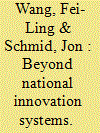

|
|
|
|
|
| Summary/Abstract |
This article describes the nature of innovation performance in the People’s Republic of China (PRC) in the context of its changing national innovation system (NIS). More specifically, it proposes to explain China’s lack of frontier innovation as reflected by the low quality of Chinese patents and scientific publications. Moving beyond the NIS—the prevailing framework for understanding national innovation rates—this article offers additional determinants to explain the unique profile of Chinese innovation. Through interviews with stakeholders from each of the three major NIS actor types and analysis of the incentive environment, two determinants of China’s high rate of nominal patenting are identified. First, the incentive structure facing inventors, scientists and entrepreneurs is found to be ill-suited to promoting innovation. Second, the ubiquitous officials-rank standard (guan benwei) is identified as a mediating variable that amplifies the effect of suboptimal incentives in promoting nominal (as opposed to real) innovation. In essence, the authors find that ill-structured innovation incentives and the officials-rank standard work in tandem to create a high proportion of nominal innovations in the PRC.
|
|
|
|
|
|
|
|
|
|
|
|
|
|
|
|
| 3 |
ID:
153388
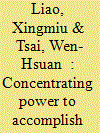

|
|
|
|
|
| Summary/Abstract |
This article discusses the operations of the Chinese Communist Party (CCP) pishi system from the perspective of decision making. As an authoritarian regime, the CCP ‘concentrates power to accomplish big things’, demonstrating the extent of the CCP’s state capacity. This article argues that, through a wide range of documentation, the CCP provides leaders with a channel for resource accumulation, to issue pishi (written directives). Next, mishu (secretaries) play an extremely important role in the transmission of documents and the execution of pishi. This article then goes on to point out that the CCP’s practice of nomenklatura is a key means to ensure that pishi are executed as expected. Finally, this article discusses the advantages and disadvantages of the pishi system.
|
|
|
|
|
|
|
|
|
|
|
|
|
|
|
|
| 4 |
ID:
153382
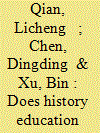

|
|
|
|
|
| Summary/Abstract |
Most studies of Chinese nationalism are based on an unstated and unexamined assumption that history education in Chinese schools can effectively instill the official memory of the anti-Japanese war into students. This article tests this assumption through a multi-method study based on a survey, a textual analysis and qualitative interviews with high school students and teachers. The findings show that history education (including both in-class and extracurricular forms) has limited effects on nationalism among Chinese high school students. The in-class textbook education is largely ineffective in forging nationalistic sentiments among students, whereas some extracurricular activities, such as visiting the ‘patriotic education bases’, have limited effects. The limited effects can be explained by four factors: (1) changes in the content and form of the new history textbooks; (2) the students’ and teachers’ actual uses of the textbooks; (3) the students’ cognitive and emotional agency in receiving history education; and (4) alternative information sources such as the media and family memory. This study contributes to the understanding of Chinese nationalism and historical memory by emphasizing the complexity involved in receiving official narratives.
|
|
|
|
|
|
|
|
|
|
|
|
|
|
|
|
| 5 |
ID:
153386
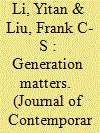

|
|
|
|
|
| Summary/Abstract |
It has been widely assumed that perceptions about mutual relationships positively influence attitudes toward trade talks. The Sunflower Movement in Taiwan that took place in the spring of 2014 seemed to create an empirical puzzle, leading observers to believe that Taiwan’s younger generations hold conservative attitudes about trade talks with Mainland China. This study, based on an analysis of representative data collected before the movement, suggests that younger generations in Taiwan are hostile to Mainland China politically but support trade talks. In summary, the authors find that family orientation, national/ethnic identification, state/country identification, belief in Taiwan’s democratic impact, and generation serve as critical factors in the formation of positive attitudes toward trade talks. These findings contribute to the literature by providing a deeper insight into the dynamics of the Sunflower Movement and updating the political orientation profile of Taiwanese voters.
|
|
|
|
|
|
|
|
|
|
|
|
|
|
|
|
| 6 |
ID:
153384
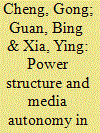

|
|
|
|
|
| Summary/Abstract |
How do Chinese media derive the autonomy to practice relatively freely, and how are they deprived of it? By analyzing the case of Southern Weekend, this study proposes one crucial factor—the central–local power structure within the Party’s censorship system to explain the dramatic changes of media autonomy in China. It argues that the divergence between the local authority and the central propagandists in dealing with the local media has guaranteed the autonomy of local media practitioners. The autonomy becomes eroded later when the central authority rationalizes the nomenklatura system of the regulatory bodies. By nurturing loyal agents at the local level, the central authority successfully eases the tension within the central–local power structure and strengthens its control over the regionally-based media outlets.
|
|
|
|
|
|
|
|
|
|
|
|
|
|
|
|
| 7 |
ID:
153381
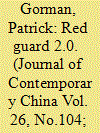

|
|
|
|
|
| Summary/Abstract |
This article investigates the role of state-nationalist discourse in the rise of online nationalism by looking at case studies of nationalist flesh searches. Nationalist flesh searches target those seen as traitorous, anti-China or anti-government, and expose the victims’ private information as well as their alleged crimes, to the online public. Through examination of this activity, the study contextualizes the rise of online nationalism within the historical and political context of the Party’s renewed emphasis on nationalism in education and state media, and the role that this state-nationalism plays in social management. Case studies follow the development of nationalist flesh searches, examining the motivations, language and goals of these online nationalists, as well as the actions of those targeted and the role, if any, of the state and the state media.
|
|
|
|
|
|
|
|
|
|
|
|
|
|
|
|
| 8 |
ID:
153383


|
|
|
|
|
| Summary/Abstract |
Using two survey experiments run on college students and average Chinese citizens respectively, this article revisits the impact of political wariness on public opinion surveys in contemporary China. The authors randomly assigned some respondents to a control group, in which face-to-face surveys were administered following the standard procedure endorsed by China’s academic survey industry. Remaining respondents were randomly assigned to experimental groups, in which the otherwise identical surveys were presented as affiliated with the Chinese Communist Party (CCP). Neither college students nor average citizens in the experimental groups showed a significantly higher non-response rate or reported more politically correct answers when probed for their assessments of China’s democratic quality and their trust in China’s political system. On the contrary, responding to possible cues conveyed by the CCP emblem interviewers wore (i.e. one of the treatments), college students significantly lowered their assessments of China’s democratic quality and raised their perceived need for fundamental changes in China’s political system; similarly, average citizens significantly downgraded their overall trust in the CCP. This research did not detect any significant influence of political wariness in the surveys.
|
|
|
|
|
|
|
|
|
|
|
|
|
|
|
|
| 9 |
ID:
153385
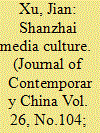

|
|
|
|
|
| Summary/Abstract |
This article studies shanzhai media culture, a specific type of shanzhai culture that copycats the most-watched shows of China Central Television (CCTV) with a sense of satire and play. The article discusses why CCTV has become a popular target of shanzhai, how CCTV’s brand shows are shanzhai-ed and what are the political implications of shanzhaing these established programs. By presenting Lao Meng’s Shanzhai Spring Festival Gala as a case study, the author argues that shanzhai media culture is a creative, participatory and Internet-facilitated grassroots media production, which attempted to resist and intervene in the power–money hegemony of CCTV underpinned by the disingenuous neoliberal logic of Chinese media. However, this culture failed to do so and has been co-opted and reshaped by the powerful logic it attempted to challenge.
|
|
|
|
|
|
|
|
|
|
|
|
|
|
|
|
| 10 |
ID:
153380


|
|
|
|
|
| Summary/Abstract |
By most accounts, nationalism in China is on the rise, as seen in both patriotic displays and anti-foreign protests. This article disaggregates two types of nationalism: patriotism and victimization derived from the ‘century of humiliations’. An original, nationwide public opinion survey of urban China shows that these two types of nationalism are derived from similar attributes and attitudes (causes) but have dissimilar impacts on views toward foreign countries (effects). In order to understand properly the causes of rising nationalism in China and its possible implications, observers must begin with the recognition that patriotism and anti-foreign sentiments are not simply two sides of the same coin, but two separate and distinct types of nationalism.
|
|
|
|
|
|
|
|
|
|
|
|
|
|
|
|
|
|
|
|
|